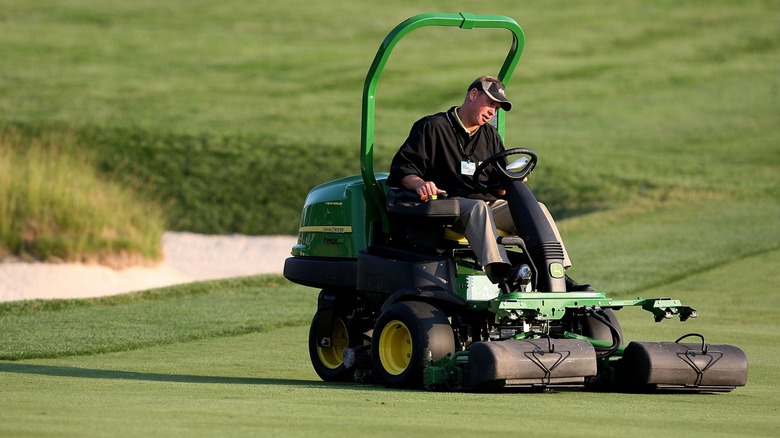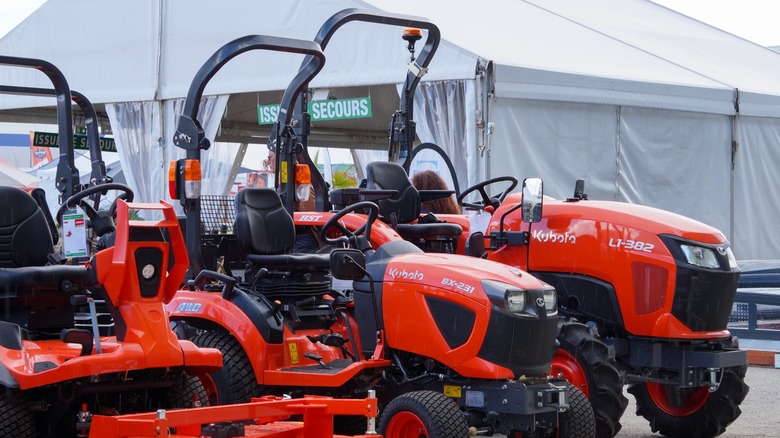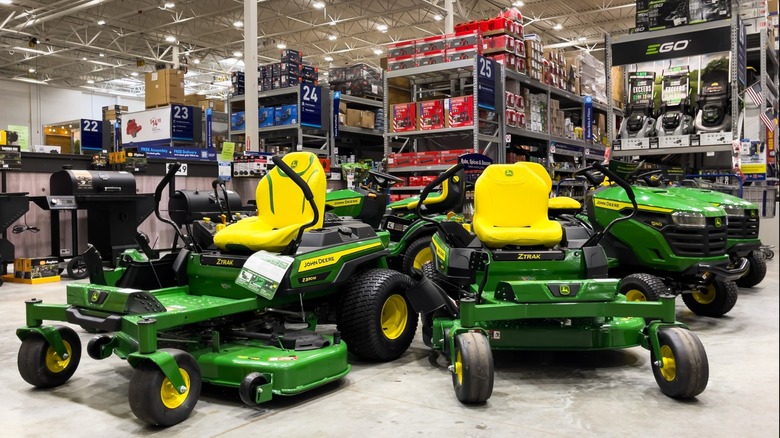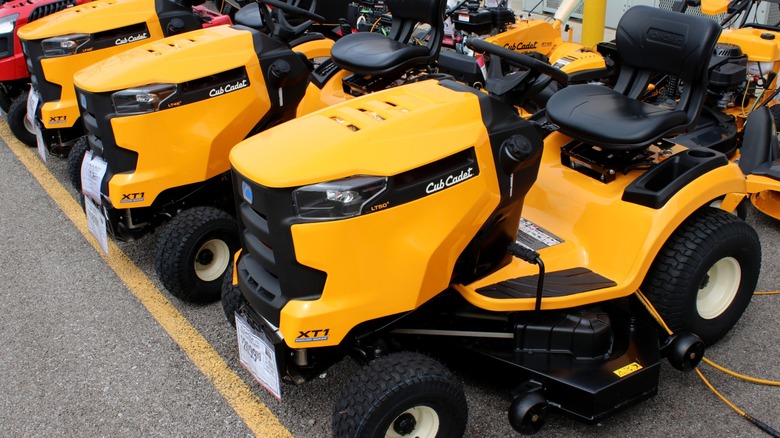Consumer Reports Are Calling These Gas Riding Lawn Mowers The Most Reliable
Lawn mowers aren't cheap. You can find some best-reviewed riding lawn mowers under $3,000, but premium options easily go for $5,000 upwards. When you're dropping that kind of money, the last thing you want is a mower that gives you trouble or spends more time in the repair shop than on your lawn. To help you avoid that, we've gone through Consumer Reports' latest reliability rankings. And that's because they didn't just look at how well a mower cuts grass or how much horsepower it has.
Their team analyzed data from thousands of owners who've actually used these mowers over multiple seasons. According to the report, they pulled from exclusive member surveys conducted in 2022, 2023, and 2024, covering more than 12,000 gas-powered riding mowers that were purchased new between 2014 and 2024. Survey results on data spanning that long sure gives one a decent perspective on which brands are truly reliable.
And when you think about it, reliability is the one factor that actually saves you money in the long run. Fewer breakdowns mean less downtime. Fewer repairs mean you're not constantly paying a mechanic. And if a mower lasts a full decade instead of dying after three, four years, you're not facing another $3,000 purchase all too soon. So, which gas riding mowers does Consumer Reports say are the most reliable? Some names, like John Deere and Kubota, might not surprise you. But a few others might. Let's get into the top performers and see what makes them worth your money.
Kubota
Consumer Reports had two important metrics for selecting the top performers: predicted reliability and owner satisfaction. And Kubota was the only brand that scored the highest in both categories. That doesn't come as much of a surprise, considering Kubota is a Japanese-owned company that's been making farm and construction equipment since 1953. Since then, it's built a reputation for producing an extensive lineup of solid machines for both commercial and residential applications.
If you own a small farm, you might be interested in Kubota's versatile sub-compact tractors from the BX Series, powerful enough for properties up to 10 acres. If zero-turn mowers are more your speed, there's an even wider selection to choose from. Models from the Z200 Series, for instance, can hit mowing speeds of 8 mph with a 26-horsepower gas engine. Of course, that kind of quality doesn't come cheap. But if you wait until the best time of year to buy your lawn mower, you might catch a good deal. Even so, most owners consider the money spent on a Kubota an investment.
That's because these machines tend to keep running smoothly even after decades of regular use. On Reddit, one user mentioned that even after nearly a decade, their Kubota could still fetch almost the same price they paid for it. Of course, they had to be diligent with maintenance. And unironically, that might be the biggest downside of owning a Kubota because original parts can be pretty expensive and relatively difficult to source online.
John Deere
Of course, the horsepower on your riding mower matters, but one thing you should also consider is how easy it is to get it fixed when something breaks. And in that regard, very few brands are as iconic or deeply rooted in America's farming culture as John Deere. The company has been around since 1837, way longer than Kubota, which entered the U.S. market in 1972.
In theory, that gives John Deere owners an advantage when it comes to finding dealers, technicians, and replacement parts. And to be fair, John Deere does have wider nationwide coverage. But that doesn't always translate to better service. In fact, some owners who've used both brands say Kubota's customer service is superior. While that's debatable, it's likely also because they're dealing with fewer repairs to begin with. According to Progressive Farmer's 2022 Reader Insights Tractor Study (which surveyed over 2,200 farmers), Kubota owners generally reported fewer problems per unit compared to John Deere.
Still, for most customers, what matters is how well the machine cuts, bags, mulches, and handles. And John Deere mowers do those pretty well, earning them strong marks for both predicted reliability and owner satisfaction on Consumer Reports' list, just slightly behind Kubota. In fact, models like the X354 Lawn Tractor and Z530M 24-HP V-Twin Gas Zero-Turn are among the best riding mowers of 2025 so far. That said, John Deere mowers aren't exactly cheap either. Depending on the model, you could end up spending as much as $6,000 or more.
Cub Cadet
If you're interested in rear-engine riders, since they're generally easier to operate and maintain, then Cub Cadet is a brand worth considering. The CC30 H, for instance, is a suitable choice for flat terrain on properties up to one acre. That said, the zero-turn mowers are where the brand really shines. Earlier this year, we listed Cub Cadet's Ultima ZT1 50-inch Lawn Mower as one of the top ride-on lawn mowers for effortless grass maintenance. However, Consumer Reports shines a spotlight on the ZT2. Much of the design in general emphasizes comfort, from the padded grip on the adjustable lap bars to the high-back padded seats.
The difference between the two, however, comes down to slight improvements in the tires, transmission, and pricing. The ZT1 features 20-inch rear tires and a Hydro-Gear EZT transmission, while the ZT2 upgrades to larger 22-inch rear tires and a more robust and serviceable Hydro-Gear ZT-2800 transmission. Price-wise, the ZT1 50-inch model costs around $3,800, while the ZT2 50-inch version goes up about $1,000 extra.
According to Consumer Reports tests, the Cub Cadet Ultima ZT2-50 excels at everything it's advertised for: cutting, mulching, handling, and side-discharging. It comes with convenient features like a washout port that makes cleaning clippings beneath the deck easy, as well as armrests — something missing from the ZT1. The ZT1 series generally offers cutting widths of 42, 46, 50, and 54 inches, while the ZT2 line expands the range with 46, 50, 54, and 60 inches.
Gravely
Interestingly, Gravely is one lawn mower brand that TikTok has been obsessing over lately. One particular model making the rounds is the Pro-Stance 36 Kawasaki — a commercial-grade push mower that retails for about $9,000. However, their zero-turn mowers are also worth paying attention to. While Gravely doesn't quite match the top-tier reliability ratings of Kubota or John Deere, Consumer Reports does rank it slightly higher than Cub Cadet in the mid-range category.
Just like the other brands on this list, Gravely offers an extensive lineup of capable riding mowers to choose from. The ZT 42 Kawasaki, for instance, goes for $3,999 and features a 603cc Kawasaki engine that generates about 18 horsepower and reaches mowing speeds of 6 mph. Now, Cub Cadet's ZT2 does have a slight leg up here with a forward speed of 7.5 mph. But Gravely's ZT X 52 Kawasaki, priced just over $4,000, comes close with its 726cc engine that delivers up to 7 mph forward speed and 23 horsepower.
Beyond the paper specs, you'll find plenty of satisfied owners on the r/lawnmowers subreddit talking about how durable these machines are. One owner reported using the same Gravely zero-turn for 13 years, and they estimate they have about 1,000 hours on it. Ultimately, how long a riding lawn mower lasts depends largely on how you use and maintain it. But it does help that the brand designs its mower to look and feel more like commercial-grade equipment than a typical residential model.
How we compiled this list
We started with Consumer Reports' 2025 reliability report on gas riding lawn mowers. They already did a good job outlining which brands are least likely to develop major repair issues within the first five years of ownership. And as we said earlier, the data behind those rankings comes from exclusive Consumer Reports member surveys from 2022, 2023, and 2024, covering more than 12,000 gas-powered riding mowers purchased new between 2014 and 2024. Their rankings focused on predicted reliability (likelihood of breakdowns and repairs) and owner satisfaction (overall experience with the product).
They also made sure to specify which type of gas mower was particularly reliable: whether lawn tractors, zero-turn mowers, or rear-engine riders. From there, we cross-checked Consumer Reports' findings by combing through owner reviews from retailer websites like Home Depot and Lowe's, as well as manufacturer websites. We also read through several discussions in subreddits like r/lawnmowers and r/lawncare, where owners share their experiences with each brand.
We wanted to provide you with a clear picture of each brand and its gas riding mower's capabilities. So, for additional context, we even consulted industry surveys like the Progressive Farmer's 2022 Reader Insights Tractor Study. Where we could, we tried to draw contrasts between these brands and their features, highlighting what makes each one worth the spend.





